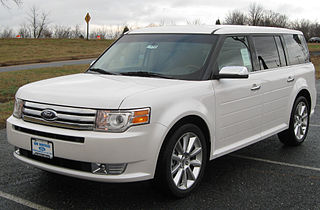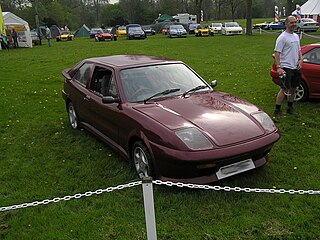
Jeep is a brand of American automobile and a division of Stellantis. Jeep has been part of Chrysler since 1987, when Chrysler acquired the Jeep brand, along with remaining assets, from its previous owner American Motors Corporation (AMC).

Land Rover is a British brand of predominantly four-wheel drive, off-road capable vehicles, owned by multinational car manufacturer Jaguar Land Rover (JLR), since 2008 a subsidiary of India's Tata Motors. JLR currently builds Land Rovers in Brazil, China, India, Slovakia, and the United Kingdom. The Land Rover name was created in 1948 by the Rover Company for a utilitarian 4WD off-roader; yet today Land Rover vehicles comprise solely upmarket and luxury sport utility cars.

A sport utility vehicle or SUV is a car classification that combines elements of road-going passenger cars with features from off-road vehicles, such as raised ground clearance and four-wheel drive.

A kit car is an automobile available as a set of parts that a manufacturer sells and the buyer then assembles into a functioning car. Usually, many of the major mechanical systems such as the engine and transmission are sourced from donor vehicles or purchased new from other vendors. Kits vary in completeness, consisting of as little as a book of plans, or as much as a complete set with all components to assemble into a fully operational vehicle such as those from Caterham.

Rebadging in the automotive industry is a form of market segmentation used by automobile manufacturers around the world. To allow for product differentiation without designing or engineering a new model or brand, a manufacturer creates a distinct automobile by applying a new badge or trademark to an existing product line.

A car platform is a shared set of common design, engineering, and production efforts, as well as major components over a number of outwardly distinct models and even types of cars, often from different, but somewhat related marques. It is practiced in the automotive industry to reduce the costs associated with the development of products by basing those products on a smaller number of platforms. This further allows companies to create distinct models from a design perspective on similar underpinnings.

A crossover, crossover SUV, or crossover utility vehicle (CUV) is a type of sport utility vehicle-like vehicle built with unibody frame construction. Crossovers are often based on a platform shared with a passenger car, as opposed to a platform shared with a pickup truck. Because of that, crossovers may also be referred as "car-based SUVs". Compared to truck-based SUVs, they typically have better interior comfort, a more comfortable ride, superior fuel economy, and lower manufacturing costs, but also inferior off-road and towing capability. Forerunners of the modern crossover include the 1977 Matra Rancho and the AMC Eagle introduced in 1979.

A knock-down kit is a collection of parts required to assemble a product. The parts are typically manufactured in one country or region, then exported to another country or region for final assembly.

The Kaiser-Frazer Corporation was the result of a partnership between automobile executive Joseph W. Frazer and industrialist Henry J. Kaiser. In 1947, the company acquired the automotive assets of Graham-Paige, of which Frazer had become president near the end of World War II. Kaiser-Frazer was the only new US automaker to achieve success after World War II, if only for a few years. Joseph W. Frazer left the company in 1949, replaced as president by Henry's son Edgar F.Kaiser

Specialty Equipment Market Association (SEMA) of the automobile aftermarket was formed in 1963 by Roy Richter, Ed Iskenderian, Els Lohn, Willie Garner, Bob Hedman, Robert E. Wyman, John Bartlett, Phil Weiand Jr, Al Segal, Dean Moon, and Vic Edelbrock Jr. and now consists of 6,383 companies worldwide, bringing together aftermarket manufacturers, original equipment manufacturers (OEM), media, car dealers, specialty equipment distributors, installers, retailers and restoration specialists.
Ford Otomotiv Sanayi A.Ş. is an automotive manufacturing company based in Turkey that is equally owned by Ford Motor Company and Koç Holding. It was established in its current form in 1977, with original relations dating back to 1928. It currently operates five facilities throughout the country, and is headquartered in Gölcük, with a second location in İnönü.

The Willys MB and the Ford GPW, both formally called the U.S. Army Truck, 1⁄4-ton, 4×4, Command Reconnaissance, commonly known as the Willys Jeep, Jeep, or jeep, and sometimes referred to as G503, were highly successful American off-road capable light military utility vehicles built in large numbers to a standardized design for the United States and other Allied forces in World War II from 1941 to 1945.
Jeep — with a capital J — is a trademarked automotive brand, currently owned by Chrysler, part of Stellantis.
Sylva Autokits is a kit car manufacturer based in Lincolnshire, England. Sylva was founded in 1981 by Jeremy Phillips and has developed and produced a number of small and lightweight sports cars. Sylva cars have won a number of 750 Motor Club Kit Car championships.
Fiberfab was an American automotive manufacturer established in 1964. Starting with accessories and body parts, they progressed to making kit cars and fully assembled automobiles. They became one of the longest lasting kit car manufacturers.

Quantum Sports Cars was founded by Mark and Harvey Wooldridge in 1987.

Beauford is a British family run automobile company based in Biddulph, Stoke on Trent. The cars are supplied in kit form and are therefore highly customisable. Beauford are founding members of S.T.A.T.U.S..
Royston Charles Lunn was an engineer in the automotive industry. He had forty-one years in the design development and production of vehicles and most notably served as the head of engineering at American Motors Corporation (AMC) from 1971 to 1987. Lunn is credited as being the "father of the modern SUV" and "the godfather of the Ford GT40."

Eagle Cars Limited was an English company, based in Lancing, West Sussex, originally operated by Allen Breeze, although it has undergone a number of ownership changes since. Originally making a Jeep lookalike called the RV, between 1981 and 1998 they built several iterations of a gull-winged car called the Eagle SS. The SS was based on an American kit car called the Cimbria, and was brought to the UK by Tim Dutton. In 1988 Eagle Cars moved inland, to nearby Storrington.

New Zealand had a long history of small garages and vehicle enthusiasts modifying and creating sports and sports racing cars. Out of these interests grew the New Zealand kit and replica car industry with the introduction of fibre-glass car bodies in the 1950s.















